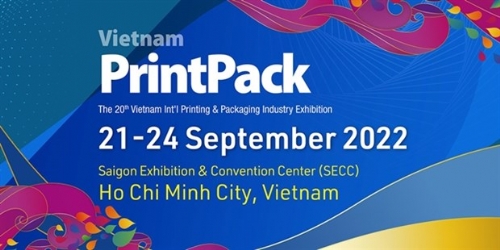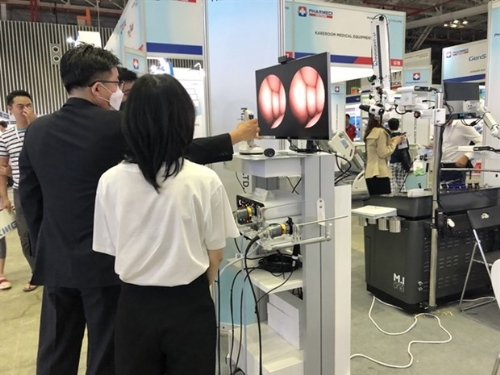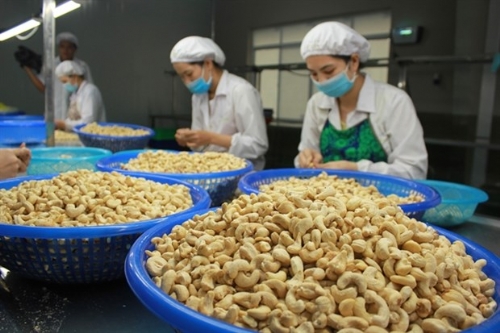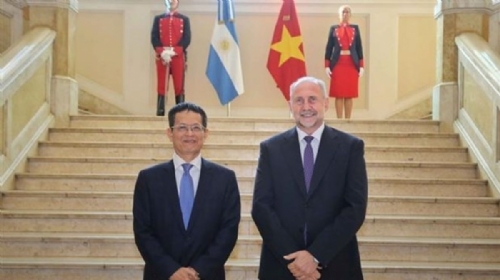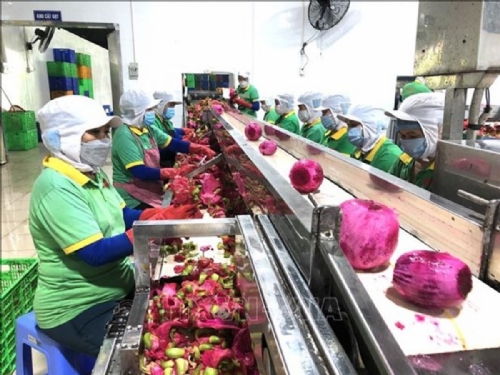Vietnam - Russia: Time-tested Relationship
Friday, January 17, 2020 12:08

On the occasion of the 70th anniversary of the Vietnam - Russia diplomatic relationship, the Vietnam Business Forum Magazine has an interview with Mr. Konstantin V. Vnukov, Ambassador Extraordinary and Plenipotentiary of the Russian Federation to Vietnam.
What do you think about the close friendship between Vietnam and the former Soviet Union, and between Vietnam and Russia, over the past nearly 70 years?
In 2020, we are celebrating 70 years of Vietnam - Russia diplomatic relations. This is the official event but our relations dated back to much earlier than 70 years ago. I can characterize this relationship: Mutual support and assistance in the struggle for national liberation. A lot of previous Vietnamese revolutionaries came to study in Russia, including President Ho Chi Minh. Currently, many Russian cities have President Ho Chi Minh Monuments, such as Moscow and Vladivostok. An event that is little known to many is, during the Great Patriotic War, in December 1941, Vietnamese volunteer soldiers joined the defense of Moscow and it was unfortunate that most of them sacrificed heroically.
Indeed, the bilateral relationship has been tested by time during the past 70 years. The previous generations clearly remembered the events in the 1950s, 1960s and 1970s when the Soviet Union delivered great assistance to Vietnam. In the early 1990s and late 2000, the Soviet Union ceased to exist and Vietnam faced economic hardships. Despite that difficulty, the two countries preserved their most precious thing - friendship. It was exactly 25 years ago we established a political relationship. That relationship is not built on ideology but on national rights and interests. Time has proven it. I also want to refer to a momentous event in 2001 when President Vladimir Putin paid the official visit to Vietnam for the first time and he told me that, during that visit, he hosted a meeting with graduates from Soviet Union universities. He said he would never forget the warmth that he received from them. We have not only protected that strong friendship but also created the new home and new relationships. At present, we have established relations in all aspects of cooperation. We have recently upgraded our relationship to a comprehensive strategic partnership. Vietnam has that high level of relationship with only a few countries, and I am very happy that Russia is one. In fact, Vietnam is our main partner in Southeast Asia. And, it is no coincidence that Russia and four other countries in the Eurasian Economic Union signed a free trade agreement with Vietnam. I believe our relationship always has a bright future.
Could you please introduce some remarkable activities of the Embassy of the Russian Federation in Vietnam and your own activities since you took office to promote and tighten this diplomatic relationship?
Our Embassy and other Russian representative agencies (Trade Representation of the Russian Federation in Vietnam, and Consulates General of the Russian Federation in Ho Chi Minh City and Danang City) play a very important role in this relationship. I feel fortunate that there are no political issues between the two countries and our important task here is to promote bilateral economic, trade and investment relations. Last year, the two-way trade value reached US$6 billion but we must set a new mission to the value of US$10 billion and I believe this is possible. In addition, we have social and humanity cooperation. We realize that Vietnamese people are very keen on Russian education. Vietnam secures first position among the countries that receive scholarships of the Russian government. I think that education investment is the best investment for the future. Among successful entrepreneurs in Vietnam, 80% studied in Russia, including leaders of Vingroup, Sungroup and Eurowindow, and we will thus continue this tradition.
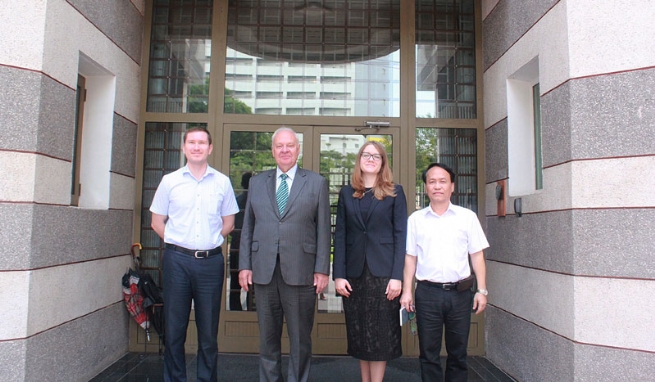
How do you assess the significance of the official visits by General Secretary Nguyen Phu Trong to the Russian Federation in September 2018 and by Prime Minister Nguyen Xuan Phuc in May 2019? Then, what do you think about prospects for the comprehensive strategic partnership between the two countries?
These visits have played a huge role in fostering bilateral relations and allowed us to find new collaborations and projects and solve outstanding problems. These two visits witnessed the signing of many important agreements. I attended both visits which, I think, produced satisfactory results. The leaders of the two countries knew each other very well and exchanged many compliments to each other. They immediately started discussing and seeking solutions to matters of concerns in an open, friendly manner. General Secretary Nguyen Phu Trong visited Galuna Oblast - a highly developed region. He paid a visit to a dairy complex of TH True Milk Group. We look forward to promoting local cooperation as this is an important resource to develop trade. Also on this visit, a delegation of Thanh Hoa province visited Tula Oblast and promised to cooperate in building an eye hospital and a cosmetic hospital here. In the coming time, some other areas of cooperation will be established by the two countries, such as e-government, digitalization, cybersecurity, especially food and agriculture. I know Vietnamese people highly appreciate the quality of Russian foods, and we have great demand for Vietnamese seafood, vegetables and fruits. If we remove barriers, then we will have a good trade and must expand potential more.
The Vietnam - EAEU Free Trade Agreement has been in force for nearly three years. Despite positive results, there are still some small barriers. In your opinion, which factors are needed to make breakthroughs from this pact?
With this agreement, Vietnam can access the market of 180 million consumers. However, this process also poses a lot of complexities and barriers. In the food sector, the first barrier is quality, with a lot of administrative barriers to exporters, including import licenses. Vietnam is very interested in Russian meat but import registrations in Vietnam are very slow. In Tula, a company has sought solutions to this issue and exported turkey meat to Vietnam. Regarding transportation, we are working out this approach but there is still no freight corridor. The formation of a railway through China and then to Kazakhstan and to Russia is a good opportunity for Vietnamese goods to reach EAU countries. We also need to expand maritime transport because previously the sea was the only route from Vietnam to European countries. Vietnam plays a bridging role between EAU countries and ASEAN countries. We are also excited to be building a strategic partnership with ASEAN. In 2020, Vietnam will assume the ASEAN chairmanship and we will certainly play an active role.
Thank you very much!
Other news
- HCM City to host Vietnam Print Pack 2022 expo(9/16/2022 11:02:26 AM)
- Medical-pharmaceutical, beauty products exhibitions open in HCM City(9/16/2022 10:58:48 AM)
- Firms must work to fully benefit from UKVFTA: Insiders(8/24/2022 3:15:30 PM)
- Vietnam, Argentina boost trade cooperation(8/23/2022 3:51:49 PM)
- Workshop helps fresh fruit exporters learn about China’s new regulations(8/23/2022 3:47:36 PM)
- HCM City to host Int'l Textile & Garment Industry Exhibition(8/23/2022 3:11:55 PM)
- Saigon Autotech & Accessories Show to be held in late October(8/19/2022 8:38:38 AM)
- Vietnamese handicrafts go on sale at New York Now 2022(8/18/2022 8:52:55 AM)
- Week of OCOP products launched in Hanoi(8/17/2022 8:39:01 AM)
- Trade fair looks to expand “One Commune One Product” markets(8/16/2022 11:21:14 AM)


